

The Monkey's Paw. By W.

W. Jacobs "Be careful what you wish for, you may receive it. " --Anonymous Part I. To Build a Fire. By Jack London Day had broken cold and grey, exceedingly cold and grey, when the man turned aside from the main Yukon trail and climbed the high earth- bank, where a dim and little-travelled trail led eastward through the fat spruce timberland.

It was a steep bank, and he paused for breath at the top, excusing the act to himself by looking at his watch. It was nine o'clock. There was no sun nor hint of sun, though there was not a cloud in the sky. The Lottery. By Shirley Jackson Shirley Jackson's short story The Lottery was published in 1948 and is not in the public domain.
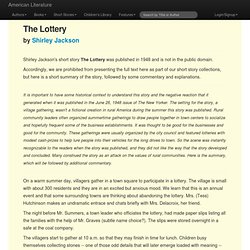
Accordingly, we are prohibited from presenting the full text here as part of our short story collections, but here is a short summary of the story, followed by some commentary and explanations. It is important to have some historical context to understand this story and the negative reaction that it generated when it was published in the June 26, 1948 issue of The New Yorker. The setting for the story, a village gathering, wasn't a fictional creation in rural America during the summer this story was published. Rural community leaders often organized summertime gatherings to draw people together in town centers to socialize and hopefully frequent some of the business establishments.
On a warm summer day, villagers gather in a town square to participate in a lottery. The night before Mr. The villagers start to gather at 10 a.m. so that they may finish in time for lunch. Mr. The Legend of Sleepy Hollow. By Washington Irving Found among the papers of the late Diedrech Knickerbocker.
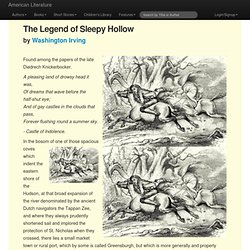
A pleasing land of drowsy head it was, Of dreams that wave before the half-shut eye; And of gay castles in the clouds that pass, Forever flushing round a summer sky. - Castle of Indolence. In the bosom of one of those spacious coves which indent the eastern shore of the Hudson, at that broad expansion of the river denominated by the ancient Dutch navigators the Tappan Zee, and where they always prudently shortened sail and implored the protection of St. Nicholas when they crossed, there lies a small market town or rural port, which by some is called Greensburgh, but which is more generally and properly known by the name of Tarry Town. I recollect that, when a stripling, my first exploit in squirrel-shooting was in a grove of tall walnut-trees that shades one side of the valley. The Tell-Tale Heart. By Edgar Allan Poe Illustration of "The Tell-Tale Heart" by Harry Clarke, from Edgar Allan Poe's Tales of Mystery and Imagination, 1919.
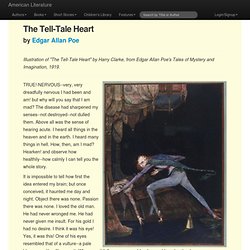
TRUE! -NERVOUS--very, very dreadfully nervous I had been and am! But why will you say that I am mad? The disease had sharpened my senses--not destroyed--not dulled them. It is impossible to tell how first the idea entered my brain; but once conceived, it haunted me day and night. Now this is the point. I was never kinder to the old man than during the whole week before I killed him. Upon the eighth night I was more than usually cautious in opening the door. I had my head in, and was about to open the lantern, when my thumb slipped upon the tin fastening, and the old man sprang up in bed, crying out: "Who's there? " I kept quite still and said nothing.
Presently I heard a slight groan, and I knew it was the groan of mortal terror. It was open--wide, wide open--and I grew furious as I gazed upon it. But even yet I refrained and kept still. The Imp of the Perverse. By Edgar Allan Poe In the consideration of the faculties and impulses -- of the prima mobilia of the human soul, the phrenologists have failed to make room for a propensity which, although obviously existing as a radical, primitive, irreducible sentiment, has been equally overlooked by all the moralists who have preceded them.
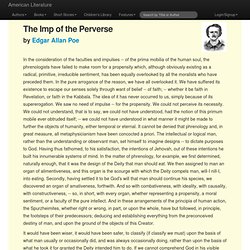
In the pure arrogance of the reason, we have all overlooked it. We have suffered its existence to escape our senses solely through want of belief -- of faith; -- whether it be faith in Revelation, or faith in the Kabbala. The idea of it has never occurred to us, simply because of its supererogation. We saw no need of impulse -- for the propensity. It would have been wiser, it would have been safer, to classify (if classify we must) upon the basis of what man usually or occasionally did, and was always occasionally doing, rather than upon the basis of what he took it for granted the Deity intended him to do. The Minister's Black Veil. By Nathaniel Hawthorne THE SEXTON stood in the porch of Milford meetinghouse, pulling busily at the bell rope.
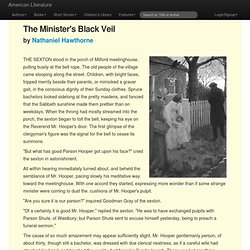
The old people of the village came stooping along the street. Children, with bright faces, tripped merrily beside their parents, or mimicked a graver gait, in the conscious dignity of their Sunday clothes. Spruce bachelors looked sidelong at the pretty maidens, and fancied that the Sabbath sunshine made them prettier than on weekdays. When the throng had mostly streamed into the porch, the sexton began to toll the bell, keeping his eye on the Reverend Mr. "But what has good Parson Hooper got upon his face? " All within hearing immediately turned about, and beheld the semblance of Mr. "Are you sure it is our parson? " "Of a certainty it is good Mr. The cause of so much amazement may appear sufficiently slight. "I can't really feel as if good Mr. "I don't like it," muttered an old woman, as she hobbled into the meetinghouse.
"Our parson has gone mad! " Mr. "Why do- you look back? "